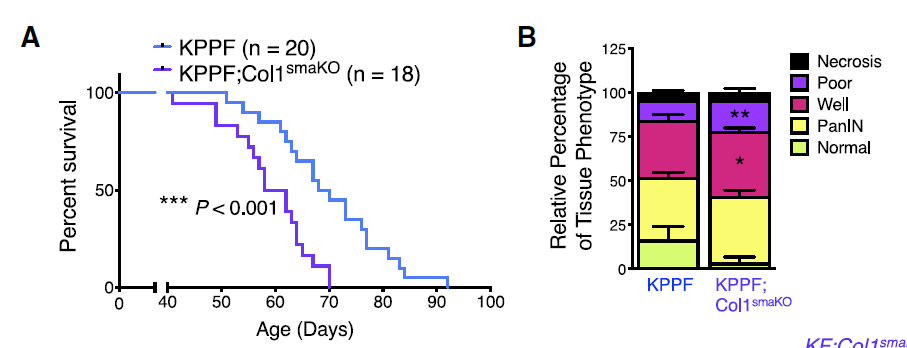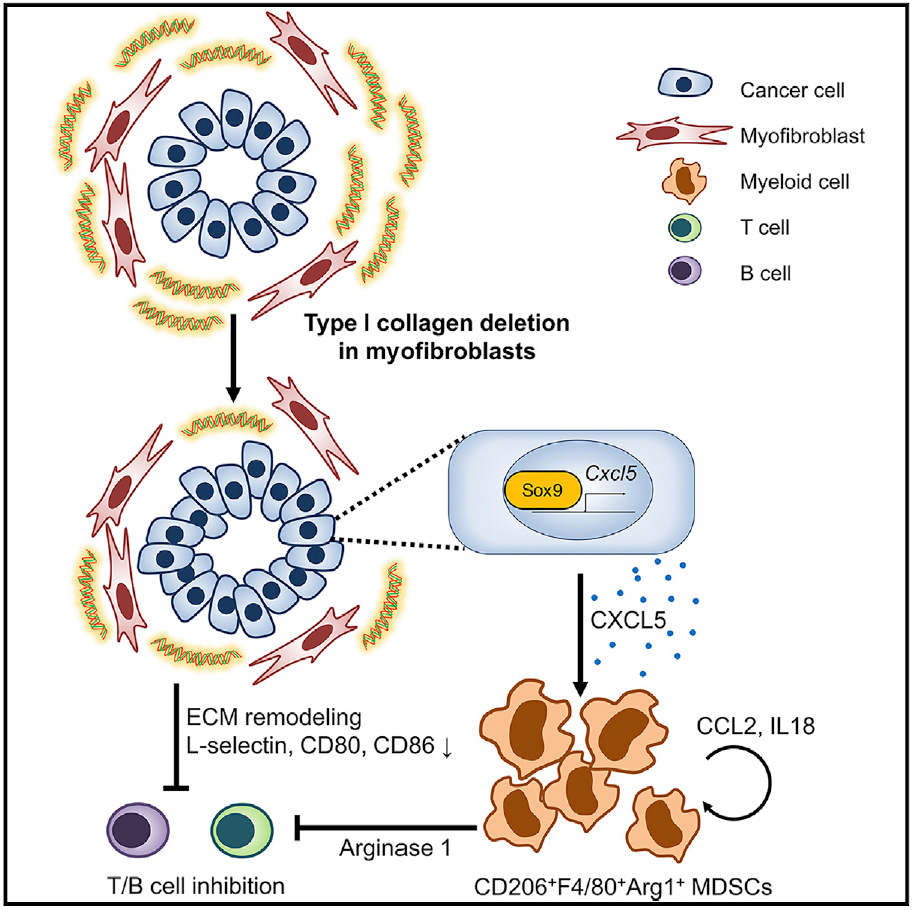Cancer Cell: Loss of collagen will also accelerate the development of cancer
- Normal Liver Cells Found to Promote Cancer Metastasis to the Liver
- Nearly 80% Complete Remission: Breakthrough in ADC Anti-Tumor Treatment
- Vaccination Against Common Diseases May Prevent Dementia!
- New Alzheimer’s Disease (AD) Diagnosis and Staging Criteria
- Breakthrough in Alzheimer’s Disease: New Nasal Spray Halts Cognitive Decline by Targeting Toxic Protein
- Can the Tap Water at the Paris Olympics be Drunk Directly?
Cancer Cell: Loss of collagen will also accelerate the development of cancer
Cancer Cell: Loss of collagen will also accelerate the development of cancer. Collagen does not promote the development of cancer as previously thought, but is part of the human body’s cancer defense strategy. It plays a role in the tumor microenvironment and inhibits the progression of pancreatic cancer.

Collagen is the most abundant protein in the human body. Type 1 collagen is the most important. Collagen is produced by fibroblasts and is mainly found in bones, tendons and skin.
During the occurrence and development of cancer, collagen tends to accumulate in and around tumors. Therefore, some researchers speculate that collagen helps to promote tumor growth, metastasis or drug resistance.
Pancreatic Cancer is a highly malignant malignant tumor of the digestive tract that is difficult to diagnose and treat. Pancreatic cancer has many subtypes, 90% of which are pancreatic ductal adenocarcinoma (PDAC).
In recent years, the incidence and mortality of pancreatic cancer have increased significantly. The early diagnosis rate of pancreatic cancer is not high, and it is often at an advanced stage when discovered. At this time, cancer cells have spread and are difficult to treat. The 5-year survival rate is less than 7%, which is the most prognostic Poor malignant tumors, so it is also called “the king of cancer.”
Type 1 collagen is the main component of the tumor matrix/microenvironment associated with pancreatic ductal adenocarcinoma (PDAC), but the specific role and mechanism of collagen in the development of pancreatic cancer are still unclear.
On March 4, 2021, researchers from the University of Texas MD Anderson Cancer Center published a research paper titled “Type I collagen deletion in αSMA+ myofibroblasts augments immune suppression and accelerates progression of pancreatic cancer” in the Cell sub-Journal Cancer Cell. .
The study found that the lack of expression of type 1 collagen in myofibroblasts can reduce the level of type 1 collagen in the pancreatic cancer tumor microenvironment. The lack of type 1 collagen will accelerate the progression of pancreatic cancer and enhance its immunosuppression.
Specifically, the loss of type 1 collagen can increase the expression of chemokine CXCL5 in cancer cells through SOX9, and the increase of CXCL5 leads to the recruitment of myeloid suppressor cells (MDSC), which in turn inhibits the anti-tumor immune response. Blocking chemokine signal transduction can reverse the anti-tumor immune properties caused by the loss of type 1 collagen and slow down the progression of pancreatic cancer.
These findings indicate that collagen does not promote the development of cancer as previously thought, but is part of the human cancer defense strategy, which plays a role in the tumor microenvironment and inhibits the progression of pancreatic cancer.
A deeper understanding of the role of collagen in the tumor microenvironment will help enhance the body’s cancer defense capabilities to produce better cancer defense and treatment effects.
In order to confirm the role of collagen in cancer development, the research team constructed a mouse model. After deleting the gene expressing collagen from myofibroblasts, the total collagen in the tumor microenvironment was reduced by more than 50%.
With the decrease of collagen, the growth of pancreatic cancer accelerated, and the overall survival rate of mice decreased significantly, indicating that collagen plays an important role in preventing cancer progression.

So how does collagen affect tumor development?
The research team further discovered that in tumors with reduced collagen, cancer cells produce higher levels of chemokines. These chemokines attract myeloid suppressor cells (MDSC), and myeloid suppressor cells (MDSC) are a type of Immune cells that suppress the anti-tumor immune response. In tumors with reduced collagen, there are more myeloid suppressor cells (MDSC), and fewer T cells and B cells produce anti-tumor immune responses.
The use of targeted therapy to block the signal transduction activity of chemokines can reverse the anti-tumor immune properties of these tumors, slow the tumor progression, and restore it to a level similar to that of the control group.

Pancreatic cancer is one of the most aggressive malignant tumors. It has an immunosuppressive tumor microenvironment and is a type of cancer with poor immunodetection. The overall prognosis is poor, with a five-year survival rate of less than 7%.
The research team said that collagen itself may not be a particularly effective defense mechanism, but if a person suffering from pancreatic cancer is compared to a car with a brake failure, then it is not possible to stop as quickly as when the brakes are good. There is no brake.
Our body is doing its best to control the development of pancreatic cancer. Collagen is one of the brakes. When collagen is lost, it will produce a more harmful immunosuppressive tumor microenvironment.
Therefore, increasing collagen or enhancing its downstream pathways may be a strategy to restore the brakes, which is expected to slow the development of pancreatic cancer.
In general, these findings indicate that collagen does not promote cancer development as previously thought, but is part of the human cancer defense strategy, which plays a role in the tumor microenvironment and inhibits the progression of pancreatic cancer. A deeper understanding of the role of collagen in the tumor microenvironment will help enhance the body’s cancer defense capabilities to produce better cancer defense and treatment effects.
(source:internet, reference only)
Disclaimer of medicaltrend.org



